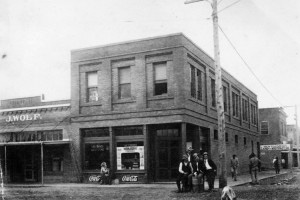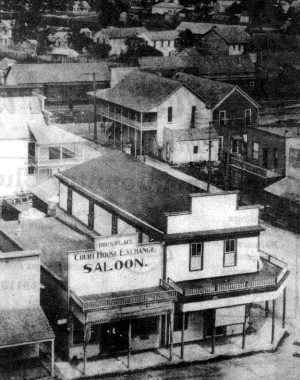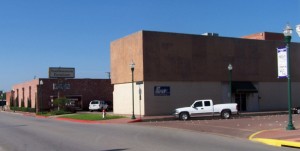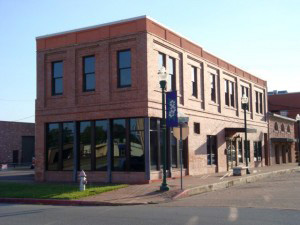Following a devastating fire that
destroyed most of the downtown
area in February 1911, Conroe became
a whirlwind of activity as brick
masons and construction crews worked
to rebuild the city and its economy.

A
Center of Commerce
The wooden
Corner Drug Store was
consumed by the large fire
that destroyed downtown
Conroe in February 1911. The
new Collier & Harris
Building was constructed on
the site in brick in 1911 to
comply with the new city
downtown construction
ordinance.
Among
the first to erect a brick
structure, the newly mandated
construction standard, was Dr. J. F.
Collier and his partner Dr. Harris –
the men behind the original Collier
& Harris Building at the corner of
Pacific and Simonton Streets.
“The
Corner Drug Store, a wooden
structure destroyed in the fire,
reopened in July of 1911,” said
Conroe historian Larry Foerster.
“The drug store featured ‘the
prettiest soda fountain in East
Texas’.”
Little
is known about Harris, but Collier
was a civic leader in the community,
serving as Conroe’s first mayor in
1905, president of the Conroe
Independent School District and
chairman of the Good Roads Committee
that focused attention on converting
roadways and thoroughfares for use
by the new “horseless carriages.”

The old Corner Drug Store
(Collier Building) is found
in the background as a white
corner building with a
second-floor balcony. Old
Conroe on the east side of
the tracks can be seen in
the top of this photo taken
from the top of the old
Courthouse. This photo was
taken prior to the big fire
that destroyed much of
downtown in February 1911
The
first floor of the building served
as a drugstore with retail sales
while the second floor housed
offices for the doctors, attorney
Winston McMahan and the Montgomery
Land Abstract Company.
In the
late 20s, the building saw new life
as the White Kitchen Café, serving
up down-home cooking like fried
chicken, pork chops and beef steaks,
according to longtime Conroe
resident and civic leader Whitson
Etheridge, 95.
“Most
people ate their meals at home back
then; there weren’t a whole lot of
restaurants back in the early days,”
he said. “Going out to eat was a
special treat, so I remember it
well.”
Etheridge was just a boy, but he
remembers visiting the White Kitchen
Café on a number of occasions during
its existence. He said the menu was
plain by modern standards, but the
food was very good.
Following an incarnation as the
Union Café, the Collier & Harris
building evolved into an appliance
store called Miracle Sales, operated
by J. M. Weisinger and his wife
Modena. The couple sold Maytag and
Bendix appliances.
The
first level also featured Ruby’s
Beauty Shope and Buckshot Smith’s
Barbershop in the 1950s. Bob
Shepard, owner of Shepard’s
Barbershop in Conroe recalled the
Collier & Harris Building being one
in a series of retail businesses on
Pacific Street facing the railroad
tracks.
“At the
time, that was a busy area of
commerce in downtown,” said Shepard.
“It’s pretty much all gone now.”
While
the first floor of the building
served as retail, restaurant and
service space, the upstairs has
mostly been office space for doctors
and lawyers – except for a brief
stint as a rooming house. Records
are a vague, according to Foerster.

Before Restoration in the 1960's
The Collier & Harris
Building was given a
facelift to match more
modern building designs. It
was used for law offices for
building owners Mathis
McKinney and R. A. “Mickey”
Deison, and their Universal
Land Title Company
In the
60s a more modern façade was
constructed over the original brick
building and the structure became
the offices for Mathis McKinney and
R. A. “Mickey” Deison and their
Universal Land Title Company and law
offices.
The law
firm of Price & Price acquired the
building and restored the structure
around 2008 to its original brick
exterior. The restoration, along
with other downtown revitalization
programs, is returning the historic
look and feel of downtown Conroe,
said Foerster.
While
the Collins & Harris Building is not
architecturally significant, it is a
historic part of Conroe’s past –
serving as host facility for a wide
range of commercial businesses and
professional services.

Collins & Harris Building
at Pacific & Simonton
streets in 2012. It houses
the law firm of Price and
Price.
“It’s
part of our history and heritage,”
said Foester. “It’s important to
preserve the past for future
generations.”

Vote Montgomery County TXGenWeb County of the Month



